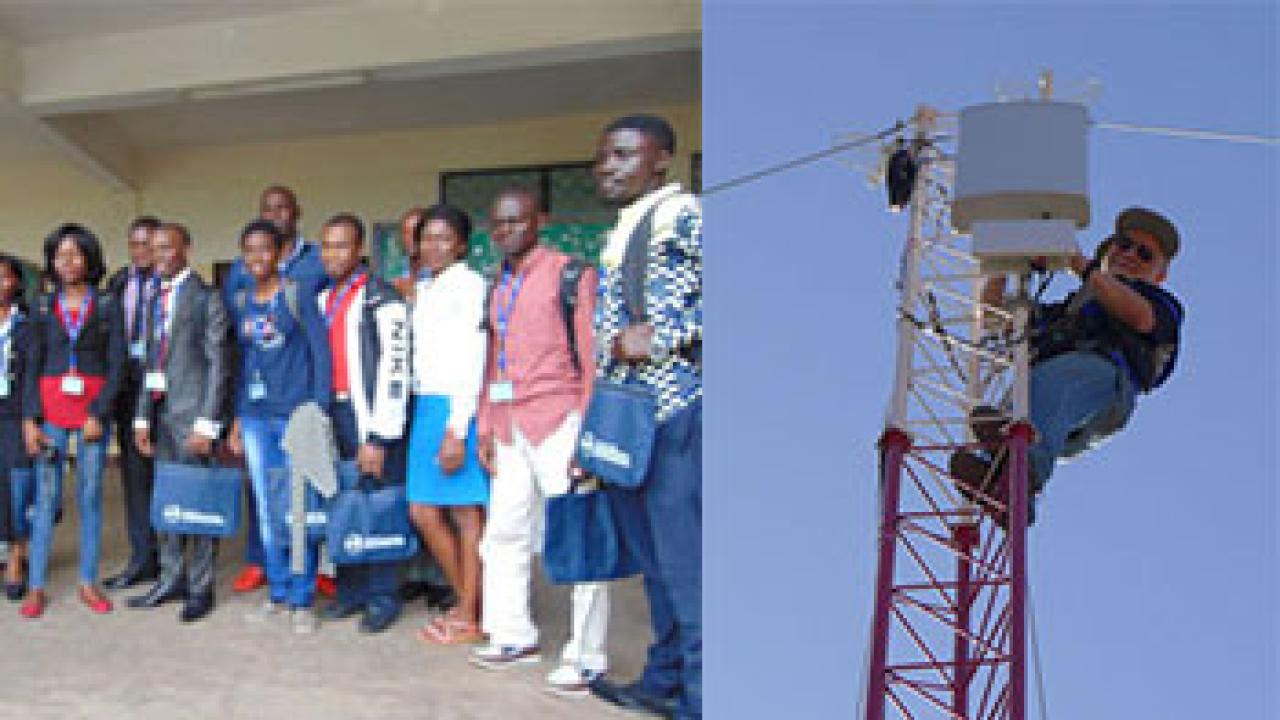
The ICTP Scientific Calendar is full of workshops, conferences, and schools, all vital parts of a scientist's year, activities that serve as crucibles of communication, learning, and collaboration. ICTP hosts and sponsors these events all over the world, most recently in Cameroon and Mozambique, among others. While they may not have the drama of an awards ceremony or the thrill of publishing a new paper in a high-impact journal, they are crucial parts of both the scientific process and ICTP's mission to advance scientific knowledge in the developing world.
A prime example is a school co-organized recently by ICTP's Condensed Matter and Statistical Physics (CMSP) section at the University of Buea in Cameroon, hosted by physicists Alain M. Dikande and Cornelius F. Lukong. The focus was on sharing in-depth knowledge on cooperative phenomena in condensed matter physics, with a focus on atomic systems (ultra-cold gases), mesoscopic systems (quantum dots and nanostructures) and quantum optics. Longer lectures by experts from all over the world were interspersed with new research presentations by younger scientists, as well as roundtable discussions on challenges in the field.
"I think it was a very successful activity," says Mikhail Kiselev, one of the ICTP scientists who helped organize and participated in the school. "One of the most important goals was to establish cooperation between African scientists, and to let them know some of the most interesting topics and directions in condensed matter physics." The conference attracted scientists from all over Sub-Saharan Africa, including many from the host country and university, whose scientists first proposed the school. "Cameroon is of course one of the countries where there exists an expertise in condensed matter physics, strong expertise in the field of non-linear science," Kiselev says. Since the end of the school, many attendees have requested follow-up programs in the near future.
Another recent collaboration saw ICTP scientists traveling to Mozambique, working with a team from the Institute of National Communications of Mozambique. Instead of a formal school or conference, the goal of this collaboration was to deploy a pilot project of new wireless internet technology. ICTP scientists Marco Zennaro and Ermanno Pietrosemoli, who visited their Mozambique collaborators this past August, are both key members of the Wireless Lab at ICTP, a group that has been working for more than 20 years to expand wireless connectivity in developing countries. "You need to have internet access to do research in physics and math," says Zennaro, explaining that his group focuses jointly on research, training, and deployment of wireless technology.
The project, the first phase of a planned longer collaboration, focused on establishing wireless links over long distances using frequencies normally used by TV stations. The resulting internet availability will allow Mozambican scientists to continue with a wide variety of research, as well as help the Institute of National Communications decide the best ways to expand the project and wireless access throughout the country. "All of our research is in collaboration with scientists from developing countries, and we write scientific papers with them," Zennaro explains. This model and focus on both research and deployment has helped facilitate a wide range of projects in many countries, from Ecuador to Malawi, resulting in a steady stream of both published papers and projects deployed.
Feedback for both activities reflects the level of effort and energy ICTP scientists typically put into making these activities a success. Dr. Belobo Belobo Didier, a researcher at the University of Yaoundé I in Yaounde, Cameroon, wrote his thanks following the conclusion of the CMSP school: "I have learned many things from lectures presented and discussions following each lecture. On the other hand, from discussions with lecturers during coffee-breaks and lunches I have enlarged my perspectives both scientifically and professionally. I have also exchanged experience and knowledge with other participants and gotten contacts for future research projects. Moerover, the activity was also friendly, we spent a really good time together."
A formal letter of thanks was sent to ICTP Director Fernando Quevedo following the Mozambique collaboration, from the Director General of the Institute of National Communications of Mozambique, Américo Muchanga: "We have the deepest personal and professional respect for both Dr. Zennaro and Prof. Pietrosemoli, and sincerely believe their constructive approach on technology deployment, optimism, passion, and tireless creativity will inspire our local team for future technology projects."
Both of these ICTP activities, and the wide range of other schools, projects, conferences, and workshops held throughout the world and throughout the year, exemplify the continuous hard work of researchers seeking to spread scientific expertise and access. These collaborations may not make the front page of a newspaper, but their worth is clear.













